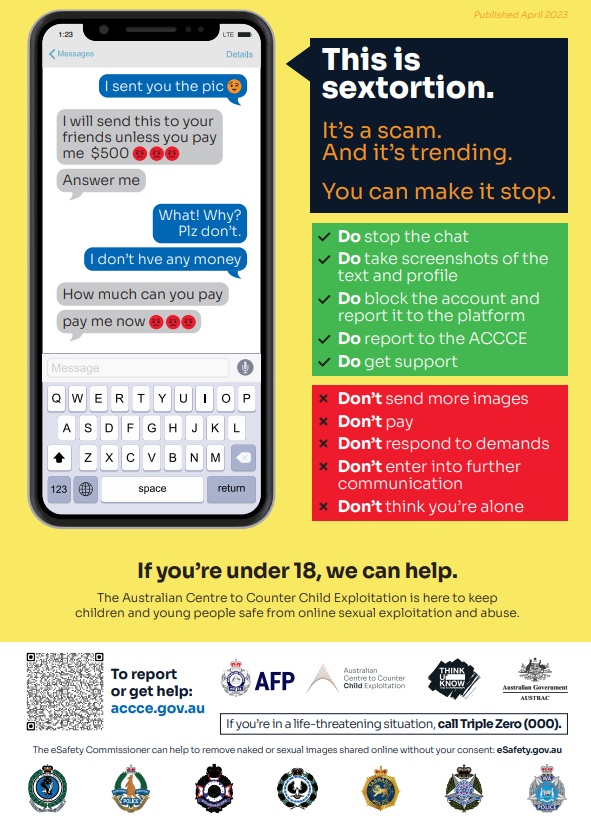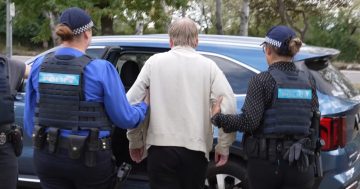
Australia is experiencing a global trend of offenders predominately targeting teenage boys for sextortion. Photo: File.
It can begin as innocently as a random friend request and end up as something much more sinister.
Sex extortion, or sextortion, is a form of online blackmail where someone tricks or coerces another to send sexual images, following up with threats to share the images unless demands are met. These are usually in the form of more images, payment or sexual favours.
It’s a crime that’s been reported six times to ACT Policing since 1 August 2023, but Detective Inspector Stephanie Leonard, Officer in Charge of the Sexual Assault and Child Abuse Team, believes it’s “significantly under-reported”.
“It’s, unfortunately, more common than people think and we don’t want kids to feel embarrassed or ashamed or scared, and subsequently providing more images because they don’t know what to do,” she said.
Victims are typically kids in their late teens and the crime can occur through a variety of online platforms, including social media and gaming.
Generally a perpetrator will reach out to a number of people pretending to be a mutual friend.
“It’s as simple as a random add on a social media platform, because they’ve seen your friends or they might add multiple friends so it looks like you have mutual friends, and it just goes from there,” Det Insp Leonard said.
“They then engage [the child] in conversation, convince them to provide an image, and then once you’ve provided that first image, it just goes on and on and on.”
Det Insp Leonard explained perpetrators will make the conversation turn sexual quite quickly, and may also move platforms to something more secure.
Her advice is to never send the image in the first place.
“Don’t send the image. You don’t know them.”

Sextortion can escalate quickly from innocent conversation to demands and threats once images have been secured. Photo: ACCCE.
If you do end up sending an image, fear, coercion and manipulation will keep the crime going. Victims will be threatened that the images will be sent to their friends or family unless they pay money or provide even more images.
Offenders may even try to capture sexual images of a young person while on live stream or video in a method known as “capping”.
Images produced of person under the age of 18 are considered child abuse material but Det Insp Leonard stressed if you’re a victim coming to police, you won’t be charged with breaking the law.
“No one is ever going to get in trouble with the police for coming forward and saying ‘I did this and now this is happening to me’,” she said.
While identifying the offender can be incredibly difficult, police can work with other agencies to try to take down any images, however there is no guarantee once images have been published.
Most importantly, they can help the victim make the cycle of abuse stop.
“They will keep asking for images and then that has an adverse impact on an individual’s mental health. We’ve seen self-harming, depression, anxiety – it can lead to all sorts of other problems worrying about ‘who’s got my photo, where’s it been distributed, where’s it been posted’,” Det Insp Leonard said.
“We can help stop what’s happening and give advice to parents and kids on where to go from there.”
Based on intelligence, usually if it’s happening to you, it’s likely the offender is also targeting those on your friends list.
Given it’s the holiday season and teens may be getting electronic devices for Christmas, Det Insp Leonard said it was also up to parents to open lines of communication and make their kids know it’s ok to come to them if they’re feeling unsafe online.
“I think kids are worried that they’re going to get in trouble, that they may have done the wrong thing, so it’s about being open and honest and explaining the dangers of the online world,” she said.
“It can happen without parents knowing, if their kids have access to pocket money or other cash, they can easily be being blackmailed or extorted for hundreds of dollars.
“It just keeps going on … but we’re here to help.”
Information about sextortion, how to prevent it and where to go for help can be found via the Australian Centre to Counter Child Exploitation website.
If you believe you, or someone you know, are a victim of sextortion, attend a police station or call 131 444. In life-threatening situations, call Triple Zero (000).





















